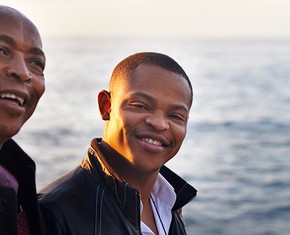The views expressed in our content reflect individual perspectives and do not represent the authoritative views of the Baha'i Faith.
Most religions refer to God with male pronouns. But in 2020, could we address God as female?
Growing up, I simply accepted that we refer to God as He, with all the fatherly mental imagery this entails. But as I explored the Baha’i concept of the equality of men and women, and participate in conversations about gendered language, I began to question the reasoning behind a “male” God.
The Baha’i Writings have many quotes that explicitly address gender equality, such as this one: “Until the reality of equality between man and woman is fully established and attained, the highest social development of mankind is not possible.” (Abdu’l-Baha, The Promulgation of Universal Peace). But the writings do often refer to God with male pronouns — while also stating how beyond human imagination God is:
That which we imagine, is not the Reality of God; He, the Unknowable, the Unthinkable, is far beyond the highest conception of man. – Abdu’l-Baha, Paris Talks
If God is unknowable, why have we assigned to Him (Her? Them?) something as worldly as gender? (And yes, the quote above uses “man” to refer to all humanity. More on that later.)
The Baha’i teachings do not describe God as He is often represented — as an old man in the sky. He may be better described by other popular terms, such as “The Universe” or “The Truth” or “A Higher Power” Although they aren’t fully accurate, these terms bring to mind something much more intangible — much more all-encompassing.
The Baha’i teachings clearly state that God does not have a physical form:
To say that God is a personal Reality does not mean that He has a physical form, or does in any way resemble a human being. To entertain such belief would be sheer blasphemy. – written on behalf of Shoghi Effendi, in a letter to an individual Baha’i
Still, humanity has a long history of referring to God using gendered pronouns. After all, it’s easier. And while God isn’t a person, He is a personal Reality. When we talk about God’s influence on our lives, our sense of loyalty and love towards God, and God’s teachings, it’s much easier to address this Supreme Being as a we would a person.
In the history of most cultures, the concept of an all-powerful being probably only seemed possible to ascribe to a male figure. And Over the centuries, as the Manifestations of God imparted God’s teachings to humanity, they had to do so in language that people would understand. The concept of a “female” God may have been too much at a time when people still struggled to understand the basic spiritual concept of the equality of women and men. It also may have led to even more misconceptions about God, leading people to believe that there was more than one.
The Baha’i writings clarify that God’s true reality transcends material aspects such as gender. They explain that the use of gendered language, particularly in cases where all humanity is addressed as “man” isn’t just an issue of conventions. It’s also one of language and translations, but that does not imply that women are less than men:
Man is a generic term applying to all humanity. The biblical statement “Let us make man in our image, after our likeness” does not mean that woman was not created. The image and likeness of God apply to her as well. In Persian and Arabic there are two distinct words translated into English as man: one meaning man and woman collectively, the other distinguishing man as male from woman the female. The first word and its pronoun are generic, collective; the other is restricted to the male. This is the same in Hebrew. – Abdu’l-Baha, The Promulgation of Universal Peace
I love that the Baha’i teachings are so clear about the equality of men and women, even on the topic of language. Women and men can both manifest God’s attributes, and neither is above the other. In the eyes of God, human gender holds no spiritual meaning:
In reality, God has created all mankind, and in the estimation of God there is no distinction as to male and female. The one whose heart is pure is acceptable in His sight, be that one man or woman. – Abdu’l-Baha, The Promulgation of Universal Peace
Gendered language when referring to God, the Baha’i Faith’s international administrative body tells us, doesn’t really mean anything. Our perception of it is greatly influenced by the patriarchal standard prevalent in our society:
In the case of the generic terms in the English translations of the Baha’i Writings, the tendency to take such terms as being applicable only to males is a reflection of the male-dominated society which has prevailed for so long, and to which there is a reaction from women who are seeking legitimate recognition and equality… language is a living thing and that the intended meaning of the generic terms will doubtless become more readily apparent as the influence of the Baha’i commitment to equality of the sexes permeates human society more fully. – On behalf of the Universal House of Justice, 26 September 1993
The Baha’i Faith acknowledges that language is a “living thing” — constantly subject to changes in our culture and understanding of reality. As our words change, so does our understanding of already-existing words. Therefore, as we change society, our understanding of who God is will deepen as well.
With this transformation, society may start to realize that the “male” qualities commonly associated with God — strength, power, knowledge — are equally displayed by women. And it may start to view “female” qualities — such as love, nurturing and compassion — as inherently godly and therefore just as worthy of praise as the more forceful qualities we tend to consider male.
Does this mean we could call God by female pronouns? I think we could. But defining God as a specific gender for the sake of conversation should never cloud the truth: that God is beyond human comprehension, beyond gender, beyond a physical form or any concept of personhood that we have.
By working to establish the equality of men and women in all aspects of our lives, we draw closer to understanding God.
















Comments
Sign in or create an account
Continue with Googleor